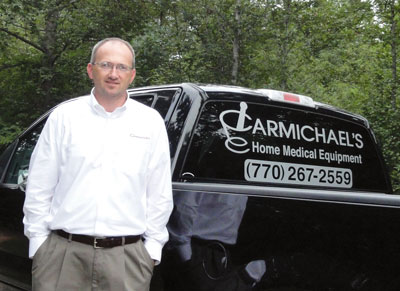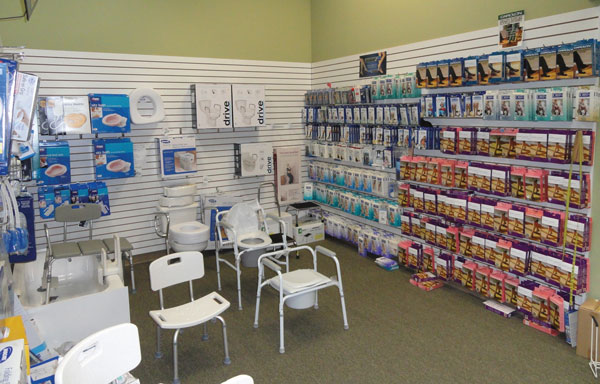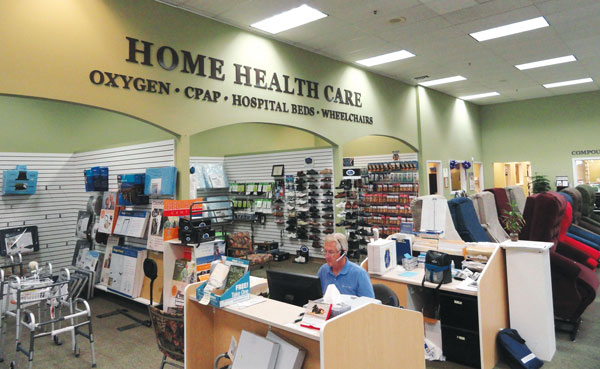Less than 50 miles outside of Atlanta, Ga., in the town of Monroe, optimism is flourishing when it comes to the home medical equipment (HME) business. Tucked in the Alcovy River Basin between Georgia’s metropolis and the Victorian/hip city of Athens, Monroe is an area of antebellum mansions, handsome old government buildings and an historic downtown. Some 13,234 people call it home, as does Carmichael’s; a three-pronged business that includes a pharmacy, HME and a Hallmark store.
The pharmacy dates back to 1903, when tonics and potions were the staples. The Hallmark store and the HME segment are later additions. Indeed, Carmichael’s Home Medical Equipment opened only six years ago, just about the time the Medicare competitive bidding axe was being sharpened and reimbursements for oxygen and mobility products were headed for the chopping block.
 It wasn’t an opportune time to open an HME store. But there was this need, you see, and Carmichael’s has built its reputation on fulfilling needs. Indeed, if you ask Bill Cheek—who, along with owner Greg Hickman, opened Carmichael’s Home Medical Equipment—about the folly of starting an HME business when it seemed that the industry was about to destruct, he would tell you it’s not so much about the equipment as it is about the patients. “If you’re just in it from a business standpoint, I don’t know that it’s something you want to be in,” says Cheek, a respiratory therapist (RT). “It’s about the people, really.”
It wasn’t an opportune time to open an HME store. But there was this need, you see, and Carmichael’s has built its reputation on fulfilling needs. Indeed, if you ask Bill Cheek—who, along with owner Greg Hickman, opened Carmichael’s Home Medical Equipment—about the folly of starting an HME business when it seemed that the industry was about to destruct, he would tell you it’s not so much about the equipment as it is about the patients. “If you’re just in it from a business standpoint, I don’t know that it’s something you want to be in,” says Cheek, a respiratory therapist (RT). “It’s about the people, really.”
Cheek is not oblivious to the need for a strong bottom line. He knows about the pitfalls of competitive bidding—Monroe is, after all, in Round 2 of the program—and he has had to grapple with debilitating audits and declining reimbursement. He is convinced, however, that if you take care of your customers and fill their needs, you’ll be successful.
So far, that business model is paying off for Carmichael’s. Even as Round 2 of competitive bidding looms, the company has opened a second location 20 miles away in Covington and it has just signed the lease for another store in Winder, some 15 miles distant.
The key to this success? Retail sales. It’s part of Carmichael’s strategy not just for staying alive, but also for continuing to thrive. “You can throw in the towel and quit, or you can take pride in helping people and giving people jobs,” Cheek says. “That’s the line I’m going to take.”
On the Road to Retail
Carmichael’s has a lot of the ingredients that make up a successful HME company. The Monroe location is two blocks away from the town hospital and boasts 19,000 square feet, about 2,500 of which is HME showroom space. It’s been around for well over 100 years, so there is high name recognition, and the Hallmark section and pharmacy generate plenty of foot traffic.
“The foot traffic is really our advertising,” Cheek says about the HME sector. “We don’t do a lot of print advertising. When people come in, there may not be a need right then, but they see what we have and they know where to get it when they do. It’s low-cost marketing.”
While Carmichael’s specializes in respiratory and CPAP, it’s a full-line HME store, providing everything from those mainstays to hospital beds, wheelchairs, nebulizers and diabetic supplies. Its retail sales are lively, with lift chairs, rollators, bathroom safety products and compression hosiery topping the list of popular items. Another plus is that Carmichael’s HME is well staffed, with five RTs—including Cheek—and 20 or so total employees. On the minus side, there is the seemingly endless decline in Medicare reimbursement, and the company’s revenue is approximately 50 percent Medicare.
“I hope to always be in the Medicare market, because those are the patients we serve,” Cheek says, noting that Carmichael’s HME is active in all competitive bidding categories except enterals. “That’s our demographic, that’s who we take care of and that’s whose needs we try to meet.”
Still, there are all the costs associated with filing Medicare claims and just being a part of the program with all its attendant red-tape trappings. Cheek says that Carmichael’s, like so many other HME companies, struggles with Medicare audits, which can stall payments for many months. “I think the biggest challenge is competitive bidding and the audits. We have a full-time person now just focusing on audits and getting our money back,” he says. “That’s something we didn’t have a year ago.”
With all of this, and the fact that reimbursement is on a downhill slide, Cheek has taken steps to cut costs. He’s reduced employee overtime and outsourced billing, which has improved cash flow. He’s also trying to decrease the number of deliveries. “We’re trying to go to nondelivery oxygen. We’re not doing it for everyone; we’re just doing it for our high-tank users. We’re trying to target our patients who could benefit from it the most and help us as well.”
Cutting back on deliveries saves on gasoline costs and the delivery tech’s time. Another bonus is that it gets people into the store. “I like having a place for my patients to come in, and if they want to pick up their tanks that’s one delivery we don’t have to make.”
Cheek is working on another way to draw people in. Even with five RTs, one is not always available for consultation in the store. The answer? “We’re going to have some oxygen therapy days where the RTs are in the store all day long.” Customers will be able to come by and talk with an RT about any respiratory-related issue.
In addition to cost-cutting measures, the company’s retail sales activities also help to bulk up the bottom line. In fact, Carmichael’s HME in Monroe has had a retail segment since it opened its doors six years ago. “We certainly concentrate on our referral sources, but retail is important to us,” Cheek says. “There is a need there, and we want to meet that need. There are a lot of things insurance doesn’t cover that can enhance a life, things that really make a difference.”
Cheek is a champion of retail. Ever since he started out in the business 17 years ago, he has worked in a setting that had a retail arm and he knows the difference it can make to a company, especially one heavily dependent on Medicare. There is no billing, no waiting to be paid. Lively retail sales can actually carry a company over the rough spots when reimbursement is held up.
“I wouldn’t want to do HME without a retail store,” he says. “In the situation the industry is in now, everything helps. I think if it will not save HME companies, it will at least be a part of the plan. I think everyone needs a plan B and this fits into the package.”

Expansive Optimism
When the Monroe operation ran out of space, Carmichael’s HME decided to expand its retail operation. While it did not need another location in Monroe, the company has deep roots in the nearby communities of Covington and Winder. “We get referrals from there,” Cheek says, “and we want to service the communities we work and live in.” So it seemed appropriate to open stores in those towns. “They would be just home medical, full-service DME, plus retail—ADLs, wheelchairs, rollators.” Carmichael’s HME opened the Covington location in June. Situated in a shopping mall with good foot traffic, it has an 800 square-foot showroom.
Despite the fact that the company has not yet embarked on its marketing program for the Covington store, the retail section is already drawing customers. However, the company cannot yet sell to Medicare customers from that location. “We can’t service Medicare there; we’re waiting for our Medicare number. It’s a slow process.”
Still, he says they’re generating a brisk walk-in retail business, so the new location is working. The third location, in Winder, should be open by the end of the year. Set diagonally across from a hospital, the store will have a 1,000 square-foot showroom. Cheek is optimistic about the future of all three stores, and he is hopeful about the future of the industry.
“Most of us who get into this business did so to care for people,” he says. He’s found it so gratifying that he hopes his children will follow in his footsteps. The satisfaction they could reap by enhancing someone else’s life is immense. “The calls, the letters we get, they make it worthwhile.”
Sidebar
The Better Way
When it comes to Medicare and survival, most home medical equipment companies are at a crossroads these days. The choices they make today could well decide whether they are here tomorrow. For Bill Cheek, who operates Carmichael’s Home Medical Equipment in Monroe, Ga., (www.carmichaeldrugs.com) survival is likely to be rooted in service. In his 17 years in the business, he’s found that and a few other things to have paid off. Here are some of the methods that have worked for Carmichael’s HME.
- If you don’t have a retail segment to your HME business, strongly consider adding one. If you have one already, build it up. Because it is “cash and carry,” retail can help stabilize your bottom line.
- Hire the right people. Carmichael’s HME made a point of hiring a man with a strong retail background, Cheek says, and that has helped immeasurably, especially from the merchandising standpoint. The man also had a background in selling shoes, so Carmichael’s sent him to training to become a diabetic shoe fitter. “He’s doing a fabulous job. That business is really growing for us.”
- Think about what your customers’ needs are and all the ways you can meet them.
- Do better than expected. “Our mission is to exceed customers’ expectations in everything we do. I think if you do that, you’ll find a way to be successful.”

